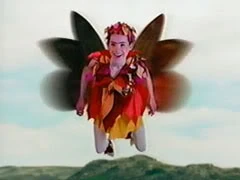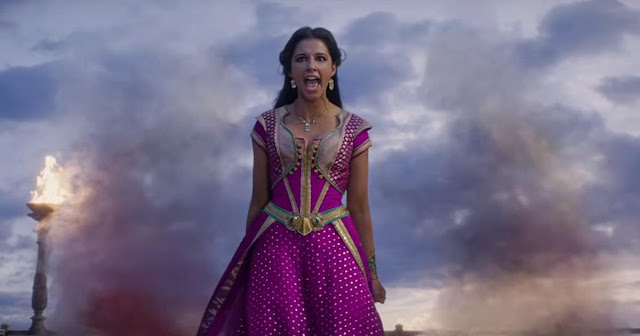Princesses in Tír Na nÓg
Tír Na nÓg is a land of eternal youth that originates from Celtic mythology. It is often associated with faeries because they are also common in Celtic myths. The most common story of Tír Na nÓg is about a beautiful woman named Niamh who fell in love with Oisín, the son of the leader of the Fianna clan on Earth. She took him back to her homeland of Tír Na nÓg where no one ever aged. They lived happily together there for three years. One day, he decided that he missed his family and wanted to visit them. Niamh sent him back to Earth on her enchanted white horse, but warned him never to touch the ground. Upon returning home, Oisín realized that 300 years had passed on Earth during the short time he spent in Tír Na nÓg, and everyone he loved was dead. When he inevitably touched the ground by accident, the 300 years caught up with his body, and he died of old age. This myth has rarely been touched upon by modern media, but the land of Tír Na nÓg occasionally does appear in fantasy stories, most notably from a show that I watched during my childhood in 1998 called Mystic Knights of Tir Na Nog.
Mystic Knights of Tir Na Nog was created by Saban, the same company that made Power Rangers and the non-Disney Little Mermaid cartoon. The Power Rangers inspiration is definitely present in the show's aesthetic and story. Like the Power Rangers, the Mystic Knights are teenagers who transform into warriors to fight monsters that are unleashed by an evil queen. However, Mystic Knights Nog takes place in a medieval setting of faeries, sorcerers, and dragons, which makes it more appealing to me. It takes place in the Irish kingdom of Kells, which is threatened by a powerful conqueror named Queen Maeve. The four Mystic Knights must pass various challenges in the magical land of Tir Na Nog. Their powers come from the four classical elements which are commonly used in fantasy stories. Rohan, a druid's apprentice, is the Mystic Knight of Fire, Angus, a thief, is the Mystic Knight of Earth, Deirdre, Princess of Kells, is the Mystic Knight of Air, and Ivan, a prince from a foreign land, is the Mystic Knight of Water. Later in the series, a new character joins the group as the Mystic Knight of Forest.
As a kid, I liked that Deirdre was a princess, but she was never my favorite princess or character on the show because she was hot-headed and temperamental. I know they were trying to push the warrior princess archetype in the '90s, but they took it a little too far with her. Her magic crossbow that released miniature whirlwinds that could knock down anyone in her path was pretty cool, though. My favorite character was the faery Aideen who had a crush on the show's main hero Rohan. Aideen was always feuding with Deirdre due to jealousy over Rohan's affection. In my favorite episode, Aideen made a deal to transform into a human so that she could have a chance with Rohan. Though Rohan was attracted to her in her human form, she had to turn back into a faery in order to save everyone. Even though it broke her heart to do so, she never told him that it was her, like in the story of "The Little Mermaid." I was always appalled by the way Rohan treated Aideen. He took advantage of her kindness, constantly asking for favors without displaying any form of gratitude.
Another princess story that references Tír Na nÓg is the fourth season of Winx Club. My biggest pet peeve about this version is that instead of changing the spelling to the more sensible "Tir Na Nog," like Mystic Knights did, Winx changed it to "Tir Nan Og," which sounded absolutely ridiculous when Bloom tried to pronounce it phonetically. Unlike the other faery realms in the Winx universe, Tir Nan Og was connected to Earth. It was where all of the faeries from Earth went when magic was banned from their home. Roxy was discovered to not only be the last Earth faery, but also the daughter of the faery queen Morgana. Though Tír Na nÓg is a Celtic myth, the name Morgana comes from Arthurian lore, which makes it odd that the Earth faeries didn't relocate to Avalon, the home of magic from those tales. In the show, the Winx girls traveled to Tir Nan Og to find Roxy's mother and the other faeries who left Earth. Roxy's revelation that Morgana is her mother makes her the princess of Tir Nan Og in the Winx Club universe.
The Celtic mythology behind the land of Tír Na nÓg is obscure and convoluted. It is rarely portrayed in modern media as the land of eternal youth, despite the stories around it. This role is more commonly assigned to Neverland. Instead, Tír Na nÓg is often used in the same context as Avalon is in many fantasy stories, a far-off realm of magic. Since faeries are common in Celtic mythology, they are common residents of Tír Na nÓg in various stories, including Mystic Knights of Tir Na Nog and Winx Club. As a fan of all things princess and faery, I love seeing new myths about this enchanting land no matter what form they may take.
Mystic Knights of Tir Na Nog was created by Saban, the same company that made Power Rangers and the non-Disney Little Mermaid cartoon. The Power Rangers inspiration is definitely present in the show's aesthetic and story. Like the Power Rangers, the Mystic Knights are teenagers who transform into warriors to fight monsters that are unleashed by an evil queen. However, Mystic Knights Nog takes place in a medieval setting of faeries, sorcerers, and dragons, which makes it more appealing to me. It takes place in the Irish kingdom of Kells, which is threatened by a powerful conqueror named Queen Maeve. The four Mystic Knights must pass various challenges in the magical land of Tir Na Nog. Their powers come from the four classical elements which are commonly used in fantasy stories. Rohan, a druid's apprentice, is the Mystic Knight of Fire, Angus, a thief, is the Mystic Knight of Earth, Deirdre, Princess of Kells, is the Mystic Knight of Air, and Ivan, a prince from a foreign land, is the Mystic Knight of Water. Later in the series, a new character joins the group as the Mystic Knight of Forest.
As a kid, I liked that Deirdre was a princess, but she was never my favorite princess or character on the show because she was hot-headed and temperamental. I know they were trying to push the warrior princess archetype in the '90s, but they took it a little too far with her. Her magic crossbow that released miniature whirlwinds that could knock down anyone in her path was pretty cool, though. My favorite character was the faery Aideen who had a crush on the show's main hero Rohan. Aideen was always feuding with Deirdre due to jealousy over Rohan's affection. In my favorite episode, Aideen made a deal to transform into a human so that she could have a chance with Rohan. Though Rohan was attracted to her in her human form, she had to turn back into a faery in order to save everyone. Even though it broke her heart to do so, she never told him that it was her, like in the story of "The Little Mermaid." I was always appalled by the way Rohan treated Aideen. He took advantage of her kindness, constantly asking for favors without displaying any form of gratitude.
Another princess story that references Tír Na nÓg is the fourth season of Winx Club. My biggest pet peeve about this version is that instead of changing the spelling to the more sensible "Tir Na Nog," like Mystic Knights did, Winx changed it to "Tir Nan Og," which sounded absolutely ridiculous when Bloom tried to pronounce it phonetically. Unlike the other faery realms in the Winx universe, Tir Nan Og was connected to Earth. It was where all of the faeries from Earth went when magic was banned from their home. Roxy was discovered to not only be the last Earth faery, but also the daughter of the faery queen Morgana. Though Tír Na nÓg is a Celtic myth, the name Morgana comes from Arthurian lore, which makes it odd that the Earth faeries didn't relocate to Avalon, the home of magic from those tales. In the show, the Winx girls traveled to Tir Nan Og to find Roxy's mother and the other faeries who left Earth. Roxy's revelation that Morgana is her mother makes her the princess of Tir Nan Og in the Winx Club universe.
The Celtic mythology behind the land of Tír Na nÓg is obscure and convoluted. It is rarely portrayed in modern media as the land of eternal youth, despite the stories around it. This role is more commonly assigned to Neverland. Instead, Tír Na nÓg is often used in the same context as Avalon is in many fantasy stories, a far-off realm of magic. Since faeries are common in Celtic mythology, they are common residents of Tír Na nÓg in various stories, including Mystic Knights of Tir Na Nog and Winx Club. As a fan of all things princess and faery, I love seeing new myths about this enchanting land no matter what form they may take.















Comments
https://mysticknightsoftirnanogpreservationproject.wordpress.com/